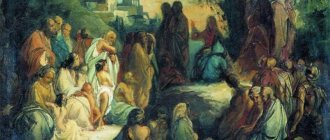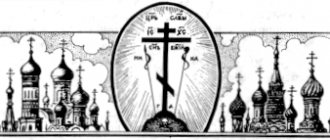The 10 Commandments (the Law of God, the Decalogue, the Decalogue) are the main 10 laws that, according to biblical tradition, God gave to Moses. In fact, they are the summary, the brief essence of other instructions that are described in the first 5 books of the Old Testament. Despite the fact that these commandments appeared more than 3,000 years ago, they remain relevant today.
At first glance, everything is obvious: you cannot kill, envy, commit adultery... However, saying does not mean doing, and in practice, observing even 10 instructions turns out to be difficult. What do the 10 commandments mean for modern man? And how can we learn to observe them today? We'll tell you about this and much more right now.
How did the 10 commandments come about?
The receipt of the Ten Commandments from God is the most significant event in the Old Testament. The very education of the Jewish people is connected with the Ten Commandments. Indeed, before receiving the commandments, a Semitic tribe of powerless and brutalized slaves lived in Egypt; after the Sinai legislation, a people emerged, called to believe and serve God, from which the great prophets, apostles and saints of the first centuries of Christianity subsequently emerged. From him the Savior of the world Himself, the Lord Jesus Christ, was born in the flesh.
The book of Exodus tells about the circumstances of receiving the Ten Commandments in chapters 19-20 and 24. One and a half thousand years before the birth of Christ, after the great miracles performed by the prophet Moses in Egypt, Pharaoh was forced to release the Jewish people, and they, miraculously crossing the Red Sea, walked through the desert of the Sinai Peninsula to the south, heading towards the promised (Promised) land. By the fiftieth day after the exodus from Egypt, the Jewish people approached the foot of Mount Sinai and camped here. (Sinai and Horeb are two peaks of the same mountain). Here the prophet Moses ascended the mountain, and the Lord announced to him:
Tell the children of Israel, If you obey My voice and keep My Covenant, you will be My people.
When Moses conveyed the will of God to the Jews, they replied:
Let us do everything that the Lord has said and be obedient.
Then the Lord commanded Moses to prepare the people for the adoption of the Law by the third day, and the Jews began to prepare for it by fasting and prayer. On the third day, a thick cloud covered the top of Mount Sinai. Lightning flashed, thunder roared, and a loud trumpet sound was heard. Smoke rose from the mountain, and the whole of it shook violently. The people stood in the distance and watched in awe what was happening. On the mountain, the Lord told Moses His law in the form of the Ten Commandments, which the prophet later retold to the people.
Having accepted the commandments, the Jewish people promised to observe them, and then a Covenant (alliance) was concluded between God and the Jews, consisting in the fact that the Lord promised His mercies and protection to the Jewish people, and the Jews promised to live righteously. After this, Moses again ascended the mountain and remained there in fasting and prayer for forty days.
Here the Lord gave Moses other ecclesiastical and civil laws, commanded the construction of the Tabernacle (a portable temple-tent) and gave rules regarding the service of priests and the performance of sacrifices. At the end of forty days, God wrote His Ten Commandments, previously given orally, on two stone slabs (tablets) and commanded them to be kept in the “Ark of the Covenant” (a gilded box with images of cherubim on the top of the lid) as an eternal reminder of the Covenant made between Him and Israel. by the people. (The location of the stone tablets with the Ten Commandments is unknown).
In chapter 2, the Second Book of Maccabees tells that during the destruction of Jerusalem by Nebuchadnezzar in the 6th century B.C. The prophet Jeremiah hid the stone tablets and some other temple accessories in a cave on Mount Nebo.” This mountain is located twenty kilometers east of where the Jordan River flows into the Dead Sea. Just before the Israelites entered the Promised Land (1400 BC). The prophet Moses was buried on the same mountain. Repeated attempts to find the tablets with the Ten Commandments were unsuccessful). The original text of the commandments is given below.
Wait, weren’t the tablets broken? And what's the story with the calf?
Long story short: after 40 days and nights spent on Mount Sinai, Moses went down to the people with the Tablets of the Covenant and discovered that the people, while he was away, had created a golden calf for themselves and were worshiping it with all their might. And this during the most monotheistic mission ever!
So Moses breaks the tablets, reprimands the people, and goes back to the mountain to settle the issues.
40 days later, having received a second, identical copy of the tablets, he descends from the mountain again, and this time the people behave well enough to accept the Covenant. This happens on the 10th of Tishrei, Yom Kippur.
“Technically, Moses was the first person to download files from the cloud using a tablet.”
In further chapters of the Torah, the Almighty commands to build a mishkan - a portable temple, and place the tablets there. When the people arrived in the Land of Israel and rebuilt the Jerusalem Temple, the tablets began to be kept there, in the Ark of the Covenant. However, after the destruction of the Temple by the Babylonians in 586 BC, the ark disappeared, and no one knows where the Tablets of the Covenant are now.
Ten Commandments - One Source
God wants people to be happy, to love Him, to love each other and not to harm themselves or others, so He gave us commandments. They express spiritual laws, they teach how to live and build relationships with God and people. Just as parents warn their children about danger and teach them about life, so our Heavenly Father gives us the necessary instructions. The commandments were given to people back in the Old Testament, we talked about this in the section on Old Testament biblical history. New Testament people, Christians, are required to keep the Ten Commandments.
Christ said:
Do not think that I came to destroy the law or the prophets: I did not come to destroy, but to fulfill (Matt 5:17).
The main law of the spiritual world is the law of love for God and people. All ten commandments say this. They were given to Moses in the form of two stone slabs - tablets, on one of which the first four commandments were written, speaking about love for the Lord, and on the second - the remaining six. They talk about attitude towards neighbors. When Jesus Christ was asked: What is the greatest commandment in the law? - He replied:
Thou shalt love the Lord thy God with all thy heart, and with all thy soul, and with all thy mind: this is the first and greatest commandment; the second is similar to it: love your neighbor as yourself; All the law and the prophets are based on these two commandments (Matthew 22:36-40).
What does it mean? The fact is that if a person has truly achieved true love for God and others, he cannot break any of the Ten Commandments, because they all talk about love for God and people. And we must strive for this perfect love. Now let's look at each commandment in more detail.
Decalogue. Ten 10 Commandments of God - Eternal Law
| The book “Returning to the Origins of Christian Doctrine” | |
| Next >> | |
| Chapter: | |
Today, many Christian denominations believe that the Decalogue (ten 10 commandments) is outdated, therefore, with the permission of God, it was slightly “corrected” by the church. I hope you are convinced that the New Testament does not teach the abolition of all
commandments of the Old Testament. Moreover, the ten 10 commandments are inviolable. To confirm this, let's pay a little more attention to them.
Let us remember that the ten 10 commandments were given to people on two
stone tablets. Attention: not on one, not on three, etc., but on two. Therefore, it is generally accepted that the commandments were divided into them as follows:
On the first tablet, the first four commandments reflected the relationship between man and God (Ex. 20:1-11):
1. Thou shalt have no other gods before Me.
2. Do not make for yourself an idol or any image of anything that is in heaven above, or that is on the earth below, or that is in the water below the earth; You shall not bow down to them or serve them, for I the Lord your God am a jealous God, visiting the iniquity of the fathers on the children to the third and fourth generation of those who hate Me, and showing mercy to a thousand generations of those who love Me and keep My commandments.
3. Do not take the name of the Lord your God in vain, for the Lord will not leave without punishment the one who takes His name in vain.
4. Remember the Sabbath day, to keep it holy; six days thou shalt work and do all thy work, but the seventh day is the Sabbath of the Lord thy God: on it thou shalt not do any work, neither thou, nor thy son, nor thy daughter, nor thy manservant, nor thy maidservant, nor thy livestock, nor thy stranger. who is in your dwellings; For in six days the Lord created heaven and earth, the sea and everything in them, and rested on the seventh day; Therefore the Lord blessed the Sabbath day and sanctified it.
on the second table, commandments five through ten were intended to regulate relationships between people (Ex. 20:12-17):
5. Honor your father and your mother, so that your days on earth may be long.
6. Don't kill.
7. Do not commit adultery.
8. Don't steal.
9. Do not bear false witness against your neighbor.
10. Thou shalt not covet thy neighbor's house; You shall not covet your neighbor’s wife, nor his male servant, nor his maidservant, nor his ox, nor his donkey, nor anything that is your neighbor’s.
It is easy to notice that the first of the two commandments of the Old Testament especially noted by Jesus, “Thou shalt love the Lord thy God...” is consonant with the teaching of the first tablet. Think about it, you cannot truly love God and at the same time have other gods (1st point), create idols, images, worship and serve them (2nd point), mention the name of God in vain (3rd point) zap) and not devote time to the Creator (4th zap). Indeed, God, through specific commandments, explained to believers how and in what ways people’s love for Him should be expressed.
Think about it, if there were no law, then each person could show his feelings towards the Creator in the way that seems right to him, but not in the way that pleases the Creator. Let us remember that the Lord compared Himself and His people to a married couple, where He is the husband, and the Israelites in the Old Testament, the church in the New - the wife (see Isa. 54:5, Jer. 3:1, Hos. 1:2, Ephesians 5:25, Rev. 12:1,6, Rev. 19:7). Now imagine that the wife will treat her husband the way she likes, without being interested in the feelings and desires of her other half. Will such a marriage be strong and happy? Of course not. This is what we see in the example of the Israelites, knowing how they repeatedly deviated from God’s commandments. That is why the Creator included relevant instructions in the Constitution of His law - in the Decalogue (ten 10 commandments), showing believers how important it is to correctly
to show your love and respect for Him, the husband of His chosen people.
And the commandment of Scripture, called by Christ the second most important, “Love your neighbor...”, is close in spirit to the second table, as it teaches relationships between people. Look at what Jesus answered to the young man when asked, “What must I do to inherit eternal life?”:
“You know the commandments: do not commit adultery, do not murder, do not steal, do not bear false witness, do not offend, honor your father and mother” (Mark 10:17-19, see also Matthew 19:17-19, Luke 18:18 -20).
Here we see an incomplete list of conditions for inheriting eternal life, since among those named there are not many important commandments, including the most important: “Thou shalt love the Lord thy God with all thy heart, and with all thy soul, and with all thy mind” (Mark 12:30 , see also Deut. 6:5, Matt. 22:37). It is obvious that Christ did not intend with this instruction to give an exhaustive
a list of saving commandments, but wanted to point out the need to observe
all of
God’s law. Look, speaking about the conditions of the inheritance of eternal life, Jesus here quoted five of the ten 10 commandments of the Decalogue (Ex. 20:12-16) and other commandments of the law of Moses: in the Gospel of Mark - “Do not wrong” (Mark 10:19 - in OT Lev. 25:17), in the Gospel of Matthew - “Love your neighbor” (Matthew 19:19 – in OT Lev. 19:18). At the same time, Jesus began the enumeration precisely with the ten 10 commandments of the Decalogue. This lesson of Christ clearly confirms His lack of desire to replace all the commandments of the Old Testament, including the Decalogue (ten 10 commandments), with one or two “generalizing” commandments. If Christ had such a goal, He would have said so. However, as we have already noted, Jesus constantly quoted the commandments of the Old Testament Scripture, including the ten 10 commandments, and urged people to keep them.
After Christ, the apostles continued to proclaim the Decalogue - the ten 10 commandments. Paul spoke with respect about the 5th
commandments: “Honor your father and mother; this is the first commandment with a promise: that it may go well with you, and that you may live long on the earth” (Eph. 6:2,3).
Paul also noted the connection between the second table of the Decalogue and the commandment that Jesus called the second most important in the law of Moses:
“The commandments: do not commit adultery, do not kill, do not steal, do not bear false witness, do not covet someone else’s and all the others are contained in this word: love your neighbor as yourself
"(Rom. 13:9).
In previous chapters we saw that many of the commandments of the Old Testament were fulfilled by Christ. However, the commandments of the Decalogue (ten 10 commandments) remained among those in force. Moreover, ten of the 10 commandments are immutable
the law of God. In the chapter “God's Law” we have already noted that in relation to the Decalogue the Lord in His Word uses only the substantive epithets revelation, covenant, testimony. We also compared the Decalogue (ten 10 commandments) with the Constitution established by the Creator. All this allows us to conclude that the ten 10 commandments of the Decalogue will not lose their relevance in the future - in the eternal life promised by God. There is plenty of evidence for this claim in the Bible, some of which we will look at now and some of which we will look at in later chapters of this book.
God Himself especially highlighted
Decalogue (ten 10 commandments) from the Law of Moses, thereby showing its immutability. Otherwise, why did He do it? Only ten 10 commandments were written personally by God (see Exod. 32:16, Deut. 5:22), only ten 10 commandments were not on scrolls, but on stone - an eternal carrier of information, and they were made twice (see Exod. 34:1, Deut. 10:1,2,4), only ten 10 commandments were constantly in the ark (see 1 Kings 8:9, 2 Chron. 5:10, Heb. 9:4), over which he appeared Lord (see Ex. 25:22, Ex. 30:6, Lev. 16:2, Num. 7:89). Let us remember that the law of Moses, written on scrolls, lay next to the ark (see Deut. 31:26).
The question of the importance of the ten 10 commandments can be approached from another angle. We will discuss the concept of “holiness” in detail later, but for now let’s analyze the text of the Bible for the holiness of the Decalogue (ten 10 commandments). According to the Holy Scriptures, there was only one saint
the city of Jerusalem (see Neh. 11:1), in it there was
one holy
mountain Zion (see Ps. 2:6, Isa. 10:32), on this mountain stood
the only
holy
on Earth (see . Ps. 5:8), in this temple there was
a holy
compartment (see Heb. 9:2), in it there was another compartment -
the holy of holies
(see Heb. 9:3), and in this holy of holies stood
a saint
the ark of the covenant (see 1 Kings 8:6, 2 Chron. 35:3).
Next to the ark was a scroll of the law of Moses (see Deut. 31:26). What was the value of the Ark of the Covenant? Of course, what was important to God was not the casket itself, nor the stones lying in it, but the ten 10 commandments written on them. Thus, according to the Holy Scriptures, the center of everything holy
on Earth was God’s law, and its “epicenter” was
the Decalogue - the ten 10 commandments .
The earthly temple and the commandments of the law of Moses associated with serving in it ceased to exist, having been fulfilled in Jesus. And the current ones
the commandments of God's law remain
holy
to this day. And of course, first of all, the Decalogue - the ten 10 commandments. Let us remember how the Apostle Paul spoke about the commandments of God:
«The law is holy
and
the commandment is holy
” (Rom. 7:12).
Christians who belittle the importance of the Decalogue (ten 10 commandments) often refer to the words of the Apostle Paul from the 3rd chapter of the Second Epistle to the Corinthians (see below 2 Cor. 3:7), where he speaks of stone tablets as deadly letters
.
In the chapters “Sin and the Law”, “The Law Embedded in the Heart. Grace” we have already discussed the relationship between the commandments and sin. Indeed, the law of Moses “condemned” man “to death” according to the commandment “The soul that sinneth shall die” (Ezek. 18:4, see also Gen. 3:17,19, Heb. 9:22, Rom. 6:23 , James 1:15). And the grace of forgiveness now justifies the sinner by imputing the righteousness of Christ to him (see 1 Pet. 3:18, 2 Cor. 5:21, Philip. 3:9, Rom. 3:21,22, Rom. 5:17, Rom. 10:4, as well as the chapter “Justification by Faith. Faith and Works”). Of course, the Epistle to the Corinthians speaks of the deadly nature of the letters
of the Decalogue with the same meaning.
If you carefully read this letter of Paul in its entirety, it will be clear that the apostle here is not talking about the abolition of the Decalogue (ten 10 commandments). He explains that, unlike in previous times, there is no longer so much writing, but Christians themselves should be a living letter from the Lord, an example for other people: “ You are our letter,
written in our hearts, recognized and read by all people;
you show by yourselves
that
you are a letter
of Christ,
through our ministry written
not
with ink,
but with the Spirit of the living God,
not on tablets of stone
, but
on tablets of flesh of the heart
” (2 Cor. 3:2,3).
Above, we have already talked about the law of God, which must be written in the heart, and about the new spirit of a Christian. That is, here Paul repeats the same thoughts, giving them a different form and accompanying them with new examples. The Apostle compares the Jewish clergy - ministers of the “letter”, with Christians - ministers of the “spirit” (see 2 Cor. 3:6), contrasting a system of numerous rules with a heart always open to the guidance of the Spirit of God. Therefore Paul says:
"If the service of deadly letters
written on the stones was so
glorious
that the children of Israel could not look at the face of Moses because the glory of his face was passing away, then should not
the ministry of the spirit
be more ? (2 Cor. 3:7,8)
“Ministry of deadly letters” here refers not only to the Decalogue (ten 10 commandments), since just above Paul mentions the ink (see above 2 Cor. 3:3) with which the scrolls of the law were written. We are talking in general about the law of Moses, which pointed to the “killing” sin, in comparison with the grace of God revealed through Christ, which can justify the sinner and cleanse
him
from all unrighteousness
(see 1 John 1:9).
The apostle calls the covenant concluded on Mount Sinai glorious
(see above 2 Cor. 3:7), despite the fact that the New Testament, based on Jesus,
is more glorious
than the previous one. Paul goes on to emphasize this again:
"The passing is glorious
much
more gloriously
does it remain” (2 Cor. 3:11).
However, not everyone accepted the spirit of the New Testament. Many Jews covered their hearts, which Paul went on to compare to the veil of Moses (see 2 Cor. 3:13-16). Then at Mount Sinai, after Moses recounted the words of the Lord to the children of Israel and his face shone, he covered his head with a veil so that people would not see the fading of the Glory of God (see Exodus 34:30-35). So now, with the coming of Christ, the Jews did not want to get rid of such a veil from their hearts, which did not allow them to see the fading of the glory of the Old Testament. Only from the hearts of those who saw the fulfillment of the law in Jesus was this veil removed.
Look, in the letter to the Hebrews it is described in detail that Jesus, in the form of a sacrifice and at the same time a High Priest, entered the true
the heavenly temple, in the image of which the earthly tabernacle was made:
"For Christ has entered
not into
a sanctuary made with hands,
built in the image of the true, but into
heaven
... He... appeared to put away sin
His sacrifice
"We have such a High Priest
Who is seated at the right hand of the throne of the Majesty in
heaven
, and is
the minister of the sanctuary and of the true tabernacle
, which the Lord pitched, and not man” (Heb. 8:1,2, see also Mark 16:19, Matt. 26:64, Luke. 22:69, Acts 7:55, 1 Pet 3:22, Rom 8:34, Eph 1:20, Col 3:1, Heb 1:3, Heb 10:12, Zech 6 :12,13, Rev. 3:21).
That is, the earthly tabernacle was only an image of the true
heavenly sanctuary. The structure of the tabernacle was shown to Moses by God on Mount Sinai: “Build the tabernacle according to the pattern that was shown to you on the mount” (Exodus 26:30, see also Exodus 25:9,40, 1 Chron 28:19).
The true heavenly temple is described in the book of Revelation, which tells the end of the history of modern Earth. John saw in him Jesus and the objects that corresponded to the furniture of the earthly sanctuary: “seven golden lampstands” (Rev. 1:12 - Exod. 37:23), “golden altar” (Rev. 8:3 - Exod. 40:5) and the ark of the covenant: “And the temple
God
in heaven
His
covenant appeared in
His temple” (Rev. 11:19 – Ex. 25:10,21).
In the earthly ark, as we know, there were tablets with the ten 10 commandments. This means that they must also be in the heavenly temple. After all, if the earthly temple was an image of the heavenly, as we see, together with the utensils, then the contents of the ark in heaven and earth should be similar to each other. If we take into account the immutability of God and His law (see the chapter “God is immutable”), as well as the fact that a little further in Revelation the importance of keeping God’s commandments is proclaimed (see below Rev. 12:17, Rev. 14:12), then we can assert: in the heavenly temple where Christ entered, there are the same ten 10 commandments, to which many today pay insufficient attention, observing them selectively or with amendments. Otherwise, if the Decalogue (ten 10 commandments) is no longer important, then what does the ark do in the heavenly temple, why does it appear to people at the end of the life of the modern Earth, and why does the book of Revelation proclaim the need for Christians to keep the commandments of God?
The Apostle John predicted that immediately before the Second Coming of Christ, which marks the beginning of judgment on humanity, Satan will wage war “against those who keep the commandments of God.”
and having the testimony of Jesus Christ” (Rev. 12:17, see also Rev. 14:12). These texts show that there will be two distinguishing marks of Satan's enemies:
1) keeping the commandments
God's
2) presence of the testimony of Jesus.
Here two independent concepts are clearly outlined together: the commandments of God the Father, of course, including the Decalogue (ten 10 commandments), and faith in His Son Jesus Christ.
At the end of the book of Revelation, on the last page of the Bible, the Lord again proclaims the commandments
, linking their observance with the inheritance of eternal life:
“Blessed are they who keep His commandments, that they may have the right to the tree of life and may enter into the city (Heavenly Jerusalem – Author’s note) through the gates” (Rev. 22:14).
| CONTENT |
| Teachings of Jesus Christ >> |
| Tags: DECALOGUE, ten, 10 commandments, God's, eternal law |
First Commandment: “I am the Lord your God”
The Lord is the Creator of the Universe and the spiritual world. He is the First Cause of everything that exists. Our entire beautiful, harmonious and very complex world could not have arisen by itself. Behind all this beauty and harmony is the Creative Mind. To believe that everything that exists arose on its own, without God, is nothing less than madness. The fool said in his heart: “There is no God” (Ps 13:1), says the prophet David. God is not only the Creator, but also our Father. He cares and provides for people and everything created by Him; without His care the world could not exist.
God is the Source of all good things, and man must strive for Him, for only in God does he receive life. We need to conform all our actions and actions to the will of God: whether they will be pleasing to God or not. So, whether you eat or drink or whatever you do, do it all for the glory of God (1 Cor 10:31). The main means of communication with God are prayer and the Holy Sacraments, in which we receive the grace of God, Divine energy.
Let us repeat: God wants people to glorify Him correctly, that is, Orthodoxy. For us there can be only one God, glorified in the Trinity, Father, Son and Holy Spirit, and we, Orthodox Christians, cannot have other gods.
Sins against the first commandment are:
- atheism (denial of God);
- lack of faith, doubt, superstition, when people mix faith with unbelief or all kinds of signs and other remnants of paganism; those who say: “I have God in my soul” also sin against the first commandment, but do not go to church and do not approach the Sacraments or do so rarely;
- paganism (polytheism), belief in false gods, Satanism, occultism and esotericism; this includes magic, witchcraft, healing, extrasensory perception, astrology, fortune telling and turning to people involved in all this for help;
- false opinions contrary to the Orthodox faith, and falling away from the Church into schism, false teachings and sects;
- renunciation of faith, relying on one’s own strength and on people more than on God; this sin is also associated with lack of faith.
Ten Commandments (Deut. 5:7-21)
- May you have no other gods before Me.
- You shall not make for yourself an idol or any likeness of anything that is in heaven above or that is on the earth below or that is in the waters under the earth; you shall not worship them or serve them; For I, the Lord your God, am a jealous God, punishing the children for the iniquity of the fathers to the third and fourth generation of those who hate Me, and showing mercy to a thousand generations of those who love Me and keep My commandments.
- Do not take the name of the Lord your God in vain; For the Lord your God will not leave without punishment the one who takes His name in vain.
- Remember the Sabbath day, to keep it holy, as the Lord your God commanded you; Six days you shall work and do all your work, and the seventh day is the Sabbath of the Lord your God. On it you shall not do any work, neither you, nor your son, nor your daughter, nor your manservant, nor your maidservant, nor your ox, nor your donkey, nor any of your livestock, nor your stranger who is with you, so that the servant may rest. yours, and your servant and your donkey, as are you; and remember that you were a slave in the land of Egypt, but the Lord your God brought you out from there with a strong hand and an outstretched arm, therefore the Lord your God commanded you to observe the Sabbath day and keep it holy.
- Honor your father and your mother, as the Lord your God commanded you, so that your days may be long, and that it may go well with you in the land that the Lord your God is giving you.
- Dont kill.
- Don't commit adultery.
- Don't steal.
- Do not bear false witness against your neighbor.
- You shall not covet your neighbor's wife, and you shall not covet your neighbor's house, nor his field, nor his manservant, nor his maidservant, nor his ox, nor his donkey, nor any of his livestock, nor anything that your neighbor has.
Second Commandment: “Thou shalt not make unto thee any graven image.”
The second commandment prohibits worshiping a creature instead of the Creator. We know what paganism and idolatry are. This is what the Apostle Paul writes about the pagans:
“Calling themselves wise, they became fools, and changed the glory of the incorruptible God into an image made like corruptible man, and birds, and four-footed creatures, and creeping things... They exchanged the truth of God for a lie... and served the creature instead of the Creator” (Rom 1:22-23, 25) .
The Old Testament people of Israel, to whom these commandments were originally given, were the custodians of faith in the True God. It was surrounded on all sides by pagan peoples and tribes, and in order to warn the Jews not to adopt pagan customs and beliefs under any circumstances, the Lord establishes this commandment. Nowadays there are few pagans and idolaters among us, although polytheism and the worship of idols exist, for example, in India, Africa, South America, and some other countries. Even here in Russia, where Christianity has been around for over a thousand years, some are trying to revive paganism.
Sometimes you can hear accusations against the Orthodox: they say, veneration of icons is idolatry. The veneration of holy icons cannot in any way be called idolatry. Firstly, we offer prayers of worship not to the icon itself, but to the Person who is depicted on the icon - God. Looking at the image, we ascend with our minds to the Prototype. Also, through the icon, we ascend in mind and heart to the Mother of God and the saints.
Sacred images were made back in the Old Testament at the command of God Himself. The Lord commanded Moses to place golden images of Cherubim in the first mobile Old Testament temple (tabernacle). Already in the first centuries of Christianity, in the Roman catacombs (meeting places of the first Christians) there were wall images of Christ in the form of the Good Shepherd, the Mother of God with raised hands and other sacred images. All these frescoes were found during excavations.
Although there are few direct idolaters left in the modern world, many people create idols for themselves, worship them and make sacrifices. For many, their passions and vices became such idols, requiring constant sacrifices. Some people have been captured by them and can no longer do without them; they serve them as if they were their masters, because:
“Whoever is overcome by someone is his slave” (2 Pet 2:19).
Let us recall these idols of passion: gluttony, fornication, love of money, anger, sadness, despondency, vanity, pride. The Apostle Paul compares serving the passions with idolatry: covetousness... is idolatry (Col 3:5). Indulging in passion, a person stops thinking about God and serving Him. He also forgets about love for his neighbors.
Sins against the second commandment also include passionate attachment to any business, when this hobby becomes a passion. Idolatry is also the worship of any person. Many people in modern society treat popular artists, singers, and athletes as idols.
First commandment
Ref. 20:2-3. I am the Lord your God... You shall have no other gods before Me.
This means:
God is one, and there are no other gods besides Him. All creation comes from Him, thanks to Him they live and return to Him. In God resides all power and might, and there is no power outside of God. And the power of light, and the power of water, and air, and stone is the power of God. If an ant crawls, a fish swims and a bird flies, then it is thanks to God. The ability of a seed to grow, of grass to breathe, of a person to live is the essence of God’s ability. All these abilities are the property of God, and every creation receives its ability to exist from God. The Lord gives to everyone as much as he sees fit, and takes back when he sees fit. Therefore, when you want to gain the ability to do anything, look only in God, for the Lord God is the source of life-giving and mighty power. There are no other sources besides Him. Pray to the Lord like this:
“Merciful God, inexhaustible, the only source of strength, strengthen me, weak, and give me greater strength so that I can better serve You. God, give me wisdom so that I do not use the power I have received from You for evil, but only for the good of myself and my neighbors for the magnification of Your glory. Amen".
In God is all wisdom, and outside of God there is neither wisdom nor a drop of knowledge. The Lord has endowed every creature with a piece of His wisdom. Therefore, my brother, if you think that God gave wisdom only to man, you will be mistaken. The bee and the fly, the swallow and the stork, the tree and the stone, the water and the air, the fire and the wind have wisdom.
The Wisdom of God abides in everything, and nothing could exist without a grain of wisdom. According to the wisdom of God, the animal senses danger in advance; and the bee builds a honeycomb; and the fly anticipates the rain; and the swallow makes a nest; and the stork nurses the chicks; and the tree knows how to grow; and the stone knows how to remain silent and keep its shape; and water can flow down from the mountain and soar in a cloud; and the fire, dormant in every thing, can warm and shine; and the wind knows where to blow, and brings purity to uncleanness and health to the sick. Indeed, no one and nothing has its own wisdom, which it itself created or gave birth to, but all wisdom flows from one single source of all kinds of wisdom. And this source is in God. Therefore, when you seek wisdom, seek it only in God, for the Lord is the Source of life-giving and great Wisdom. Apart from this Source there are no others. So pray to God like this:
“God, Almighty and All-Seeing, grant me, foolish, Your life-giving wisdom, so that I can better serve You. And guide me, Lord, so that I do not use the knowledge given to me for evil, like Satan, but only for the good of myself and my neighbors, to Your great glory. Amen".
All goodness is in God. Christ said about this: “No one is good except God alone” (Matthew 19:17). His goodness includes His mercy, patience, and forgiveness of sinners. The Lord has endowed all His creation with His goodness. Therefore, in every creature of God there is Divine goodness. Even the devil has God’s goodness, because of which he desires good for himself and not evil, but out of his stupidity he thinks to achieve good with evil, that is, he thinks that by causing evil to all of God’s creatures, he is doing good for himself. Oh, how much goodness of God is in every creation of God: in stone, in plant, in beast, in fire, in water, in air! All this goodness is borrowed from God - the inexhaustible, bottomless and great Source of all virtue. Therefore, when you seek goodness, do not look for it anywhere except in God. Only He has goodness in abundance. So, pray like this:
“All-merciful, all-merciful and long-suffering God, grant me, the wicked, your goodness, so that from your goodness I may rejoice and shine and be able to serve you even more and better. Guide me and support me, Lord, so that I do not turn Your kindness into evil, like Satan, but direct me only to joy and happiness for myself, so that I can glow with kindness and illuminate with it myself and all of Your creatures surrounding me.”
Let there be no other gods besides Me, the Lord commanded. Why do you need other gods if there is the Lord God of Hosts? As soon as you have two gods, know: one of them is the devil. But you cannot serve both God and the devil at once, just as one ox cannot plow two fields at the same time, just as one candle cannot illuminate two houses at the same time. The ox does not need two masters, for they will tear it to pieces; and the forests do not need two suns, for they will burn; and the child does not need two mothers, for there will be a “child without an eye.” And you don’t need two gods, for you will become not richer, but poorer. So stay alone with your only Lord of hosts, in Whom is all power, all wisdom and all kindness, inseparable, inexhaustible, endless. Honor Him, the One, worship Him, only fear Him. And when you begin to pray to Him, pray like this:
“Lord, my God, countless creations belong to You, but Your creations cannot have more than one God - You, the Consubstantial One. Dispel, Lord, my bad thoughts and dreams about other gods, like a strong wind disperses an annoying swarm of flies. God, cleanse my soul, illuminate it, expand and settle in it, You, the Only One, like a King in Your palace. This will lift my spirit, strengthen me, educate me, correct me and renew me. Glory and praise to You, the One True God, standing above all false deities, like the top of a mountain above a reflection in a puddle. Amen".
Third Commandment: “Thou shalt not take the Lord’s name in vain.”
To take the name of God in vain means in vain, that is, not in prayer, not in spiritual conversations, but during idle conversations or out of habit. It is an even greater sin to pronounce the name of God in jest. And it is a very serious sin to pronounce the name of God with the desire to blaspheme God. Also a sin against the third commandment is blasphemy, when holy objects become the subject of ridicule and reproach. Failure to fulfill vows made to God and frivolous oaths invoking the name of God are also violations of this commandment. The name of God is holy. It must be treated with reverence.
Saint Nicholas of Serbia. Parable:
One goldsmith sat in his shop at his workbench and, while working, constantly took the name of God in vain: sometimes as an oath, sometimes as a favorite word. A certain pilgrim, returning from holy places, passing by the shop, heard this, and his soul was indignant. Then he called out to the jeweler to go outside.
And when the master left, the pilgrim hid. The jeweler, not seeing anyone, returned to the shop and continued working. The pilgrim called out to him again, and when the jeweler came out, he pretended to know nothing. The master, angry, returned to his room and began to work again. The pilgrim called out to him for the third time and, when the master came out again, he stood silently again, pretending that he had nothing to do with it. The jeweler furiously attacked the pilgrim:
- Why are you calling me in vain? What a joke! I'm full of work!
The pilgrim answered peacefully:
“Truly, the Lord God has even more work to do, but you call on Him much more often than I call on you.” Who has the right to be angry more: you or the Lord God?
The jeweler, ashamed, returned to the workshop and from then on kept his mouth shut.
Fourth Commandment: “Remember the Sabbath day, to keep it holy.”
The Lord created this world in six days and, having completed creation, blessed the seventh day as a day of rest: he sanctified it; for in it he rested from all His works, which God created and created (Gen. 2:3).
In the Old Testament, the day of rest was the Sabbath. In New Testament times, the holy day of rest became Sunday, when the resurrection of our Lord Jesus Christ from the dead is remembered. This day is the seventh and most important day for Christians. Sunday is also called Little Easter. The custom of honoring Sunday comes from the times of the holy apostles.
On Sunday, Christians must attend the Divine Liturgy. On this day it is very good to partake of the Holy Mysteries of Christ. We dedicate Sunday to prayer, spiritual reading, and pious activities. On Sunday, as a day free from ordinary work, you can help your neighbors or visit the sick, provide assistance to the infirm and elderly. It is customary on this day to thank God for the past week and prayerfully ask for blessings on the work of the coming week.
You can often hear from people who are far from the Church or have little church life that they do not have time for home prayer and visiting church. Yes, modern people are sometimes very busy, but even busy people still have a lot of free time to often and for a long time talk on the phone with friends and relatives, read newspapers, and sit for hours in front of the TV and computer. Spending their evenings like this, they do not want to devote even a very short time to the evening prayer rule and read the Gospel.
People who honor Sundays and church holidays, pray in church, and regularly read morning and evening prayers, as a rule, manage to do much more than those who spend this time in idleness. The Lord blesses their labors, increases their strength and gives them His help.
Fourth Commandment
God commands that after six days of work, the seventh should be devoted to serving Him. In the Old Testament, the seventh day of the week was celebrated - Saturday, as the day of the end of the creation of the world. In the New Testament, the first day of the week began to be celebrated - Sunday, in memory of the Resurrection of Jesus Christ. Nowadays, a belief has spread among people that it is strictly forbidden to work on holidays and Sundays. Clarification is required: service to God cannot be replaced by work these days.
Sins against the fourth commandment:
– disrespect for Sundays and holidays, failure to attend Sunday services;
- violation of fasts.
Fifth Commandment: “Honor your father and your mother”
Those who love and honor their parents are promised not only a reward in the Kingdom of Heaven, but even blessings, prosperity and many years in earthly life. To honor parents means to respect them, to show obedience to them, to help them, to take care of them in old age, to pray for their health and salvation, and after their death - for the repose of their souls.
People often ask: how can you love and honor parents who do not care for their children, neglect their responsibilities, or fall into serious sins? We don’t choose our parents; the fact that we have them like this and not some others is God’s will. Why did God give us such parents? In order for us to show the best Christian qualities: patience, love, humility, the ability to forgive.
Through our parents, God gave us life. Thus, no amount of caring for our parents can compare with what we received from them. Here is what St. John Chrysostom writes about this: “Just as they gave birth to you, you cannot give birth to them. Therefore, if in this we are inferior to them, then we will surpass them in another respect through respect for them, not only according to the law of nature, but also primarily before nature, according to the feeling of the fear of God.
The will of God decisively demands that parents be revered by their children, and rewards those who do this with great blessings and gifts, and punishes those who violate this law with great and grave misfortunes.” By honoring our father and mother, we learn to honor God Himself, our Heavenly Father. Parents can be called co-workers with the Lord. They gave us a body, and God put an immortal soul in us.
If a person does not honor his parents, he can very easily come to disrespect and deny God. At first he does not respect his parents, then he stops loving his Motherland, then he denies his mother Church and gradually comes to denying God. All this is interconnected. It is not without reason that when they want to shake the state, to destroy its foundations from within, they first of all take up arms against the Church - faith in God - and the family. Family, respect for elders, customs and traditions (translated from Latin - transmission) hold society together and make the people strong.
Fifth Commandment
God obliges us to honor parents, take care of them, and for this he promises caring children a long life. In the Old Testament, honoring parents was so important that anyone who slandered (condemned) father and mother was sentenced to death.
Sins against the fifth commandment:
– beating the father or mother;
– disobedience to parents (except for cases where the actions and demands of parents contradict the Holy Scriptures);
– indifference to parents, reproaches and evil words towards them;
– neglect of parental blessing;
– leaving prayer for parents.
Sixth Commandment: "Thou shalt not kill"
Murder, taking the life of another person, and suicide are among the most serious sins.
Suicide is a terrible spiritual crime. This is rebellion against God, who gave us the precious gift of life. Committing suicide, a person leaves life in a terrible darkness of spirit, mind, in a state of despair and despondency. He can no longer repent of this sin; there is no repentance beyond the grave.
A person who takes the life of another through negligence is also guilty of murder, but his guilt is less than that of one who deliberately encroaches on the life of another. Also guilty of murder is the one who contributed to this: for example, a husband who did not dissuade his wife from having an abortion or even contributed to it himself.
People who shorten their lives and harm their health through bad habits, vices and sins also sin against the sixth commandment.
Any harm caused to one's neighbor is also a violation of this commandment. Hatred, malice, beatings, mockery, insults, curses, anger, gloating, rancor, ill-will, unforgiveness of offenses - all these are sins against the commandment “thou shalt not kill,” because everyone who hates his brother is a murderer (1 John 3:15) , says the word of God.
In addition to bodily murder, there is an equally terrible murder - spiritual, when someone seduces, seduces a neighbor into unbelief or pushes him to commit a sin and thereby destroys his soul.
Saint Philaret of Moscow writes:
“Not every taking of life is criminal murder. Murder is not unlawful when life is taken by office, such as: when a criminal is punished with death by justice; when they kill the enemy in the war for the Fatherland.”
What does it mean to love your neighbor as yourself?
The commandment says that only by cultivating respect for the people who surround a person can we achieve a harmonious and developing society; we can avoid negative manifestations in society only when everyone treats their neighbor
as to
yourself
, with love and thrift.
Interesting materials:
How to stop lactation correctly? How to nail fiberboard correctly? How to properly prepare henna for tinting eyebrows? How to prepare Ceresit grout correctly? How to properly prepare green tea? How to properly glue a ceiling plinth to a suspended ceiling? How to use argan oil correctly? How to properly use turmeric for weight loss? How to use vitamin E correctly? How to apply liquid glass correctly?
Seventh Commandment: "Thou shalt not commit adultery"
This commandment prohibits sins against the family, adultery, all carnal relations between a man and a woman outside of legal marriage, carnal perversions, as well as unclean desires and thoughts.
The Lord established the marriage union and blessed carnal communication in it, which serves childbearing. Husband and wife are no longer two, but one flesh (Gen. 2:24). The presence of marriage is another (though not the most important) difference between us and animals. Animals do not have marriage. People have marriage, mutual responsibility, duties to each other and to children.
What is blessed in marriage, outside of marriage is a sin, a violation of the commandment. The conjugal union unites a man and a woman into one flesh for mutual love, bearing and raising children. Any attempt to steal the joys of marriage without mutual trust and the responsibility that a marriage implies is a serious sin, which, according to the testimony of Holy Scripture, deprives a person of the Kingdom of God (see: 1 Cor 6:9).
An even more serious sin is the violation of marital fidelity or the destruction of someone else's marriage. Cheating not only destroys a marriage, but also defiles the soul of the one who cheats. You can’t build happiness on someone else’s grief. There is a law of spiritual balance: having sowed evil, sin, we will reap evil, and our sin will return to us. Shameless talking and failure to guard one's feelings are also violations of the seventh commandment.
Eighth Commandment: “Thou shalt not steal”
A violation of this commandment is the appropriation of someone else's property - both public and private. Types of theft can be varied: robbery, theft, deception in trade matters, bribery, bribery, tax evasion, parasitism, sacrilege (that is, appropriation of church property), all kinds of scams, fraud and fraud. In addition, sins against the eighth commandment include all dishonesty: lies, deception, hypocrisy, flattery, sycophancy, people-pleasing, since by doing this people are trying to acquire something (for example, the favor of their neighbor) dishonestly.
“You can’t build a house with stolen goods,” says a Russian proverb. And again: “No matter how tight the rope is, the end will come.” By profiting from the appropriation of someone else's property, a person will sooner or later pay for it. A sin committed, no matter how insignificant it may seem, is sure to return. A man familiar to the authors of this book accidentally hit and scratched the fender of his neighbor's car in the yard. But he didn’t tell him anything and didn’t compensate him for the damage. After some time, in a completely different place, far from his home, his own car was also scratched and they fled the scene. The blow was struck on the same wing that he damaged his neighbor.
The passion of love of money leads to violation of the commandment “Thou shalt not steal.” It was she who led Judas to betrayal. The Evangelist John directly calls him a thief (see: John 12:6).
The passion of covetousness is overcome by cultivating non-covetousness, charity towards the poor, hard work, honesty and growth in spiritual life, for attachment to money and other material values always stems from lack of spirituality.
Ninth Commandment: "Thou shalt not bear false witness"
With this commandment, the Lord prohibits not only direct false testimony against one’s neighbor, for example in court, but also all lies spoken about other people, such as slander, false denunciations. The sin of idle talk, so common and everyday for modern man, is also very often associated with sins against the ninth commandment.
In idle conversations, gossip, gossip, and sometimes slander and slander are constantly born. During an idle conversation, it is very easy to say unnecessary things, to divulge other people’s secrets and secrets entrusted to you, and to put your neighbor in a difficult position. “My tongue is my enemy,” people say, and indeed our language can bring great benefit to us and our neighbors, or it can do great harm.
The Apostle James says that with our tongue we sometimes bless God and the Father, and with it we curse men, created in the likeness of God (James 3:9). We sin against the ninth commandment not only when we slander our neighbor, but also when we agree with what others say, thereby participating in the sin of condemnation.
Judge not, lest ye be judged (Matthew 7:1), the Savior warns. To condemn means to judge, to boldly admire a right that belongs only to God. Only the Lord, who knows the past, present and future of man, can judge His creation.
The story of St. John of Savvaitsky:
One day a monk from a neighboring monastery came to me, and I asked him how the fathers lived. He answered: “Okay, according to your prayers.” Then I asked about the monk who did not enjoy good fame, and the guest told me: “He has not changed at all, father!”
Hearing this, I exclaimed: “Bad!” And as soon as I said this, I immediately felt as if in delight and saw Jesus Christ crucified between two thieves. I was about to worship the Savior, when suddenly He turned to the approaching Angels and said to them: “Cast him out, - this is the Antichrist, for he condemned his brother before My Judgment.”
And when, according to the word of the Lord, I was driven out, my robe was left at the door, and then I woke up. “Woe is me,” I then said to the brother who came, “I am angry this day!” "Why is that?" - he asked. Then I told him about the vision and noticed that the mantle I left behind meant that I was deprived of God’s protection and help.
And from that time I spent seven years wandering through the deserts, not eating bread, not going under shelter, not talking to people, until I saw my Lord, who returned my mantle to me.
Tenth Commandment: “You shall not covet your neighbor’s wife”
This commandment prohibits envy and grumbling. It is impossible not only to do evil to people, but even to have sinful, envious thoughts against them. Any sin begins with a thought, with a thought about something. A person begins to envy the property and money of his neighbors, then the thought arises in his heart to steal this property from his brother, and soon he puts sinful dreams into action.
Envy of the wealth, talents, and health of our neighbors kills our love for them; envy, like acid, eats away at the soul. An envious person has difficulty communicating with others. He is delighted by the sorrow and grief that befell those whom he envied. This is why the sin of envy is so dangerous: it is the seed of other sins. An envious person also sins against God, he does not want to be content with what the Lord sends him, he blames his neighbors and God for all his troubles.
Such a person will never be happy and satisfied with life, because happiness depends not on earthly goods, but on the state of a person’s soul. The kingdom of God is within you (Luke 17:21). It begins here on earth, with the correct spiritual structure of man. The ability to see the gifts of God in every day of your life, to appreciate them and thank God for them is the key to human happiness.









